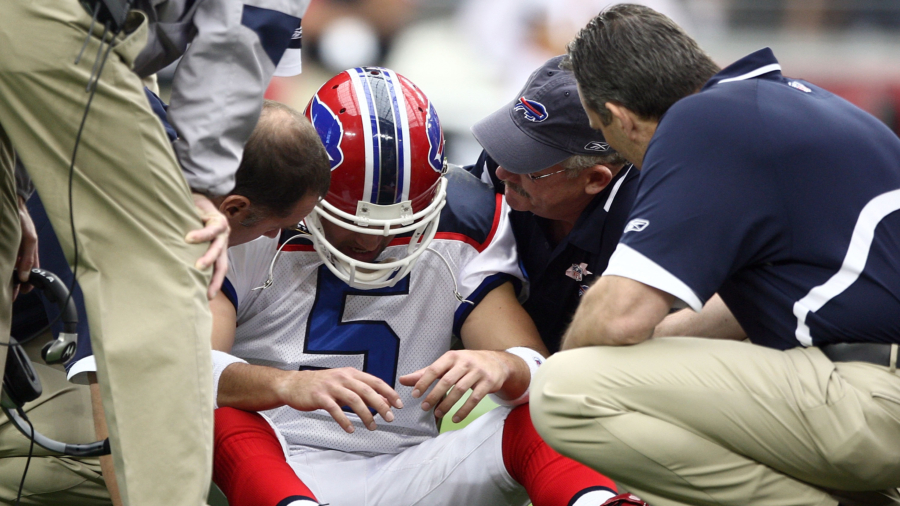The research is undeniable: football causes brain damage.
Boston University neuropathologist Dr. Ann McKee studied the brains of 202 deceased football players; 111 of them played in the NFL.
Of the 111 NFL players’ brains studied, 110 showed signs of CET.
Chronic traumatic encephalopathy (CET) is caused by repeated head trauma. It’s symptoms include memory loss, confusion, depression, and dementia. Sometimes the symptoms don’t appear until long after the player has retired.
Not all of the players who had CET were linemen or running backs, who expect to get pounded on every play. They included a punter and a place kicker.
The problem is, most of these players first started playing as children, some as young as age 6. And from age 6, their brains were subjected to the shocks of blocking and tackling—the shock of human beings colliding with all the force each could muster.
As this study proves, all that contact takes a toll.
Issues With the Data
The results of the study are accurate and undeniable, but not necessarily accurate.
Because the data can only be collected by autopsy, all the brains, which were analyzed had to be donated. Obviously, families, which suspected that a player had a problem would be more likely to donate his body to science.
Also, the ages of the bodies studied ranged from 18 to 89. In some cases lifestyle choices or other factors could have exacerbated the CET, and some of the damage might have been sustained after the player retired. (Some NFL players have gone into boxing, wrestling, or mixed martial arts after leaving the NFL.)
However, the preponderance of evidence makes the link undeniable—even for the NFL.
A Problem Long Denied
The NFL admitted in 2016 that there was a link between playing football and CET, but it first started studying the effects of head trauma in 1994, when the league set up the Mild Traumatic Brain Injury (MTBI) committee. For the most part this committee seemed aimed at discounting medical research showing any link between repeated head trauma and brain disease.
The NFL also discredited a report that NFL players were 19 times as likely to get dementia or Alzheimer’s—a study the NFL itself funded.
Finally, in December 2009, NFL spokesman Greg Aiello told The New York Times, “It’s quite obvious from the medical research that’s been done that concussions can lead to long-term problems.” This was a complete reversal of the NFL’s position up to that point.
Would Players Let Their Children Play?
Hall of Fame quarterback Troy Aikman said he wouldn’t want a son of his to play the sport.
Other famous quarterbacks said similar things. Kurt Warner, Drew Brees, and Brett Favre all said they much prefer their sons play other sports. Warner said the thought of his son playing football was scary.
Former Pittsburgh quarterback Terry Bradshaw said definitively if he had a son he would not let his son play football. Famous New York Giants’ QB Fran Tarkenton said the same.
Jets linebacker Bart Scott said he didn’t want his son to play. “I play football so he won’t have to,” Scott told New York magazine.
Chicago Bears linebacker Mike Ditka, legendary for toughness, told TIME magazine, “I wouldn’t. And my whole life was football. I think the risk is worse than the reward.”
There are some players who feel differently. Some said they’d let their sons play, but wouldn’t let them start until high school, when their bodies were more developed.
Former Denver Broncos tight end Nate Jackson told Slate.com, “I would indeed allow my children to play football. And you should, too! Like football, life is a dangerous game. We drive cars, fly in airplanes, get drunk, fall in love. We go to great lengths to ensure our own safety and the safety of our loved ones, but deep down, we know that we are never truly safe.
“That’s what makes life exciting. And that’s what makes football exciting. The players are never safe. Anything can happen at any moment. The controlled chaos on the football field is astonishing to witness, and refreshing for a spectator who may fear the chaos in his own life, and may need to be reminded how to take the leap,” said Jackson.
President Barack Obama told NFL.com, “I would not let my son play pro football.”
He then explained how he could justify enjoying watching the sport. “These guys, they know what they’re doing. They know what they’re buying into. It is no longer a secret. It’s sort of the feeling I have about smokers, you know?”

